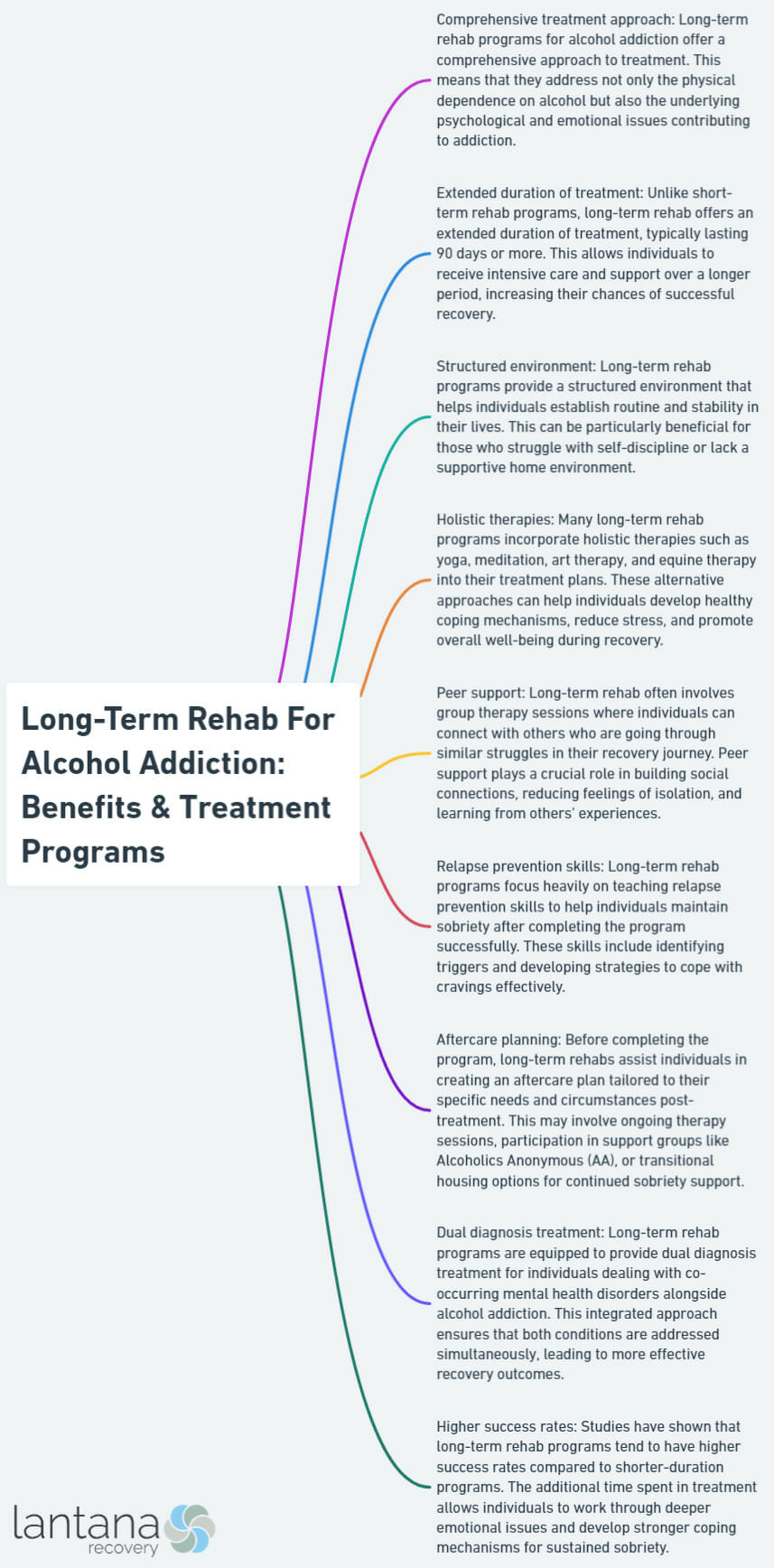Are you or a loved one struggling with alcohol addiction and considering long-term rehab? If so, you’re on the right path. Long-term rehab for alcohol not only treats addiction, but also addresses the underlying issues that contribute to it. In this blog post, we’ll discuss the various types of long-term rehab programs, their benefits, and practical advice on choosing the right facility. Let’s embark on this life-changing journey together.
Key Takeaways
- Long-term rehab programs range from 90 days to 2 years and involve detox, therapy, and aftercare support.
- They enable individuals to address underlying issues of addiction while developing the skills needed for lasting sobriety.
- Choosing a quality facility with an appropriate location is essential for successful treatment.
Understanding Long-Term Alcohol Rehab

Long-term alcohol rehab offers a comprehensive approach to long term addiction treatment, providing ample time and resources to address the root causes of addiction and develop essential coping skills. Unlike short-term treatment programs, long-term rehab enables patients to progress at their own pace, ensuring a more profound understanding of their addiction and its underlying issues.
Next, we will explore the duration and components of long-term rehab to provide you with the necessary information for decision-making.
Duration of Long-Term Rehab
Long-term rehabilitation programs for alcohol abuse generally span from 90 days to 2 years. This extended timeframe allows for a recovery-focused approach, enabling patients to receive the necessary support and care throughout their journey. With varying program lengths available, long-term rehab caters to the unique needs of each individual, ensuring the best possible outcome.
The substantial time spent in a long-term rehab setting allows patients to address and resolve the various factors contributing to their addiction. This comprehensive and in-depth approach provides a solid foundation for lasting sobriety, setting patients on the path to a healthier and more fulfilling life.
Components of Long-Term Rehab
Long-term rehab programs encompass various components of substance abuse treatment, including:
- Detoxification: the first step, helping patients achieve a substance-free state under the supervision of medical personnel
- Therapy: patients engage in individual and group therapy sessions, utilizing evidence-based approaches such as cognitive-behavioral therapy and social skills training
- Aftercare support: providing ongoing support and resources to help patients maintain their sobriety after completing the rehab program
Therapeutic communities, a type of long-term rehab, focus on creating a sense of responsibility and accountability among patients. This supportive environment aids in the development of coping mechanisms and life skills necessary for lasting sobriety.
In addition, aftercare support, including intensive outpatient treatment and outpatient day treatment, ensures a smooth transition back into everyday life.
The Importance of Long-Term Rehab for Alcohol Addiction

Long-term alcohol rehab plays a vital role in successful addiction treatment because it enhances understanding and resolution of the root causes of addiction. A recent research comparing long-term and short-term residential treatment programs for dual diagnosis patients indicated that long-term residential treatment outperforms short-term programs by allowing patients to fully address their addiction’s root causes and develop essential coping mechanisms for enduring sobriety.
Moreover, long-term rehab provides a supportive environment where patients can heal and grow, both mentally and physically. By addressing underlying issues, developing coping skills, and fostering a strong foundation for recovery, long-term rehab sets individuals on a path towards a healthier, addiction-free life.
Addressing Underlying Issues
One of the key advantages of long-term rehab is the opportunity to address the fundamental drivers of addiction. This deeper understanding of the root causes empowers individuals to face and tackle the latent issues that may have led to their addiction, ultimately preventing relapse and ensuring a more successful recovery.
Various therapeutic approaches, such as cognitive-behavioral therapy, dialectical behavior therapy, and motivational interviewing, can be employed to help individuals recognize and address these underlying issues. Additionally, 12-step programs and other support groups provide a safe and nurturing environment for individuals to explore and address these issues, reinforcing the importance of addressing underlying issues in recovery.
Building a Strong Foundation for Recovery
Extended treatment in long-term rehab allows patients to develop coping mechanisms and life skills essential for lasting sobriety. Through individual and group therapy, individuals learn to identify triggers, manage cravings, and cultivate healthy coping strategies.
Moreover, long-term rehab offers a supportive community of peers and professionals who can assist individuals in maintaining their recovery progress. The opportunity to heal from the physical and emotional impacts of addiction in a safe and nurturing environment is invaluable in building a strong foundation for recovery.
Identifying Candidates for Long-Term Alcohol Rehab

While long-term alcohol rehab can be beneficial for many individuals, those with severe addiction and dual diagnoses or co-occurring conditions may derive the greatest advantage from this type of treatment. Factors such as extended periods of addiction, inability to sustain sobriety after other treatment programs, and dual diagnosis (e.g., alcoholism and bipolar disorder) can indicate the appropriateness of long-term rehab.
Next, we will examine the role of addiction severity and concurrent mental health disorders in determining the suitability of long-term rehab. Understanding these factors can help you make an informed decision about the best treatment option for you or a loved one.
Severity of Addiction
The severity of alcohol addiction significantly influences the need for long-term rehab. Addiction severity is categorized as mild (2-3 criteria), moderate (4-5 criteria), or severe (6 or more criteria). A higher severity level may indicate a greater need for long-term treatment, as a more comprehensive and extended approach is required to address the complex nature of addiction.
Comprehending the severity of addiction, including drug abuse, enables individuals and their families to make well-informed decisions about the best treatment option. By recognizing the severity of the addiction and seeking appropriate help, individuals can set themselves on the path to recovery and long-term sobriety.
Co-occurring Mental Health Disorders
Long-term rehab is especially important for individuals with dual diagnoses or co-occurring mental health disorders. These individuals require a more comprehensive treatment approach to address both the addiction and any associated mental health issues. Long-term rehab programs, such as dual diagnosis treatment programs, offer the necessary care and support for these individuals, helping them acquire the skills and strategies to manage their mental health disorder and sustain sobriety.
By understanding the presence of co-occurring mental health disorders and substance abuse, and seeking appropriate mental health treatment through mental health services administration, individuals can greatly improve their chances of achieving lasting sobriety and maintaining their mental well-being.
Fact: According to National Institute on Drug Abuse, 7.7 Million American were diagnosed with co-occurring disorders (mental and drug abuse disorder) in 2017.
Types of Long-Term Alcohol Rehab Programs

Various long term treatment programs options are available to cater to individual needs and preferences, including residential treatment, therapeutic communities, and dual diagnosis treatment programs for drug and alcohol abuse.
Next, we’ll detail each of these options, emphasizing their distinctive features and advantages.
Residential Treatment
Residential treatment is a long-term alcohol rehab program wherein patients reside in a treatment facility and receive 24-hour care. This type of program provides a safe and supportive environment, allowing patients to focus solely on their recovery without the distractions of everyday life.
The residential treatment setting offers numerous benefits, including access to a range of therapies and services, a structured daily routine, and a community of peers who share similar experiences and goals. This comprehensive and immersive approach to treatment can be highly effective in promoting long-term sobriety and personal growth.
Therapeutic Communities
Therapeutic communities are a type of long-term alcohol rehab program that emphasizes social and psychological rehabilitation. In these communal settings, patients live alongside others in recovery, engaging in:
- Group therapy
- Individual counseling
- Skill-building workshops
- Vocational training
- Recreational activities
This supportive environment fosters personal accountability, responsibility, and the development of crucial life skills.
The efficacy of therapeutic communities in treating addiction is well-documented, with studies showing significant reductions in drug and alcohol use and improvements in mental health. By participating in a therapeutic community, individuals can build a strong foundation for lasting recovery and personal growth.
Dual Diagnosis Treatment Programs

Dual diagnosis treatment programs are specialized long-term rehabilitation programs designed to provide care for individuals with concurrent mental health disorders. These programs offer comprehensive care for both the addiction and the underlying mental health disorder, ensuring that patients receive the necessary support to manage their conditions and achieve lasting sobriety.
However, out of adults experiencing co-occurring disorders, the number of individuals who receive combination of mental health care and substance use treatment is surprisingly low. According to a research published in Health Affairs, “among adults with co-occurring disorders, 9.1 percent received both mental health care and substance use treatment.” (Prevalence, Treatment, And Unmet Treatment Needs Of US Adults With Mental Health And Substance Use Disorders, Han et al., 2017)
Dual diagnosis treatment programs typically include individual and group therapy, medication management, and holistic therapies such as yoga and meditation. By addressing both addiction and mental health issues, these programs offer a more comprehensive approach to recovery, greatly improving the chances of long-term success.
Cost and Insurance Coverage for Long-Term Alcohol Rehab
The financial aspects of long-term rehab, including cost considerations and insurance coverage options, are important factors to consider when seeking treatment.
Next, we’ll investigate the factors affecting the cost of long-term alcohol rehab programs and explore the array of available insurance coverage options.
Cost Factors
The cost of long-term alcohol rehab programs is influenced by factors such as the duration of the program, the extent of care needed, type of rehab i.e. outpatient or inpatient treatment program, and the facility’s location. Understanding these factors can help individuals make informed decisions about the most appropriate and affordable treatment option for their needs.
It’s vital to research and assess various programs to find the one that best aligns with your needs and budget. By considering cost factors and researching available options, individuals can access the necessary treatment without compromising their financial well-being.
Insurance Coverage

Insurance coverage can play a significant role in reducing the financial strain of long-term alcohol rehab. Many insurance plans, including:
- Health insurance
- Private insurance providers
- Medicare
- Medicaid
May provide coverage for long-term rehab treatment.
To determine your coverage and explore your options, it’s essential to contact your insurance provider or the treatment center you plan to attend. By verifying your insurance coverage and understanding the extent of your benefits, you can make an informed decision about the most appropriate and affordable long-term rehab program for you or your loved one.
Choosing the Right Long-Term Alcohol Rehab Facility
Selecting an appropriate long-term rehab center tailored to your needs and preferences is essential for a successful recovery journey. Factors to consider when making your decision include:
- Accreditation and licensing
- Treatment approach
- Staff qualifications
- Range of services
- Success rates
- Location
- Cost
- Insurance coverage
Next, we will examine the importance of evaluating quality and accreditation, along with the impact of location and environment.
Assessing Quality and Accreditation
Assessing a facility’s quality and accreditation is paramount for making an informed decision about rehab for long-term alcohol addiction. Factors to consider when assessing quality and accreditation include:
- The facility’s licensing and accreditation
- Staff qualifications
- Treatments offered
- Safety and security measures
- The facility’s overall reputation
Selecting a facility with proper accreditation and a track record of success can ensure that you receive the highest quality of care and adhere to established standards. By prioritizing quality and accreditation in your decision-making process, you can maximize your chances of a successful recovery.
Location and Environment

The location and environment of a long-term alcohol rehab facility can greatly impact the effectiveness of the treatment program. A secure and safe atmosphere, access to supportive services and medical facilities, and a positive community atmosphere can all contribute to a successful recovery.
When evaluating the location and environment of a long-term alcohol rehab facility, consider factors such as:
- Safety and security measures
- Proximity to support services and medical facilities
- Availability of outdoor spaces for recreation and relaxation
- A nurturing community atmosphere
By choosing a facility that meets your needs in terms of location and environment, you can set yourself on the path to lasting sobriety.
For more details, refer to our article on what is rehab like.

Summary
In conclusion, long-term alcohol rehab offers a comprehensive and in-depth approach to addiction treatment, addressing the root causes of addiction and providing the necessary tools for lasting sobriety. By understanding the various types of long-term rehab programs, considering factors such as addiction severity and co-occurring mental health disorders, and evaluating cost and insurance coverage, individuals can make informed decisions about the most appropriate treatment option for their needs. With the right long-term rehab facility and support, a healthier, addiction-free life is within reach.
Frequently Asked Questions
What are some long term goals for alcoholics?
Establishing financial stability, pursuing new career opportunities and improving personal health are key long-term goals to strive for in alcohol addiction recovery.
By getting out of debt, applying for a promotion and investing in healthier habits, lasting recovery is possible.
What is the typical duration of long-term alcohol rehab programs?
Long-term alcohol rehab programs typically last from 90 days up to 2 years, offering an intensive and thorough approach to treating addiction.
These programs provide a comprehensive approach to recovery, focusing on both the physical and psychological aspects of addiction. They also provide a supportive environment for individuals to learn how to cope with their addiction and develop the skills needed to maintain their addiction.
What are the key components of long-term alcohol rehab?
Long-term alcohol rehab programs provide a comprehensive approach to recovery, offering detoxification, therapy, and ongoing support services to ensure successful outcomes.
Detoxification helps to rid the body of alcohol and other toxins, while therapy helps to address the underlying issues that led to the addiction. Ongoing support services provide the necessary tools and resources to help individuals stay on track with their goals.
Who can benefit most from long-term alcohol rehab?
Individuals with severe addiction, dual diagnoses, or co-occurring conditions can benefit most from long-term alcohol rehab.
What factors should be considered when choosing a long-term alcohol rehab facility?
When selecting a long-term rehab center, it is important to take into account factors such as accreditation and licensing, treatment approach, staff qualifications, range of services, success rates, location, cost, and insurance coverage.









